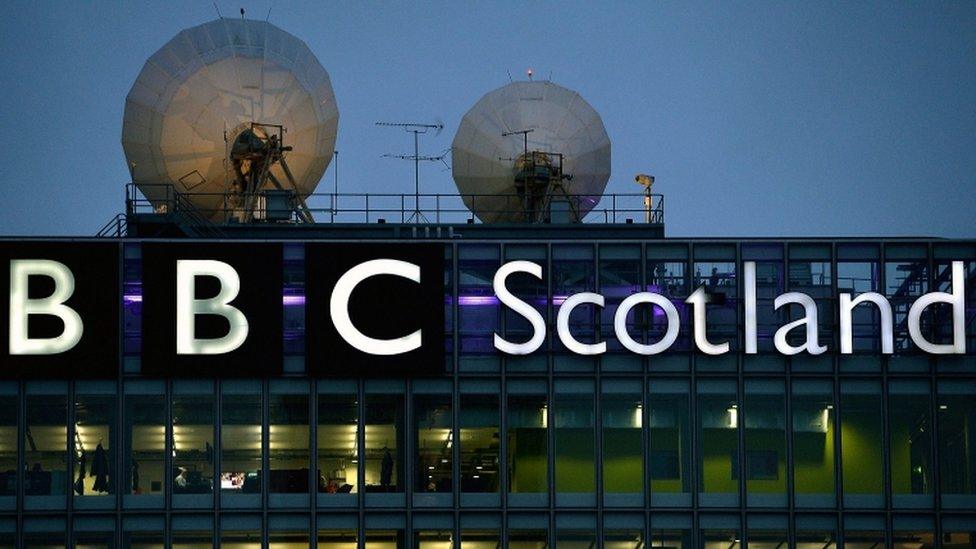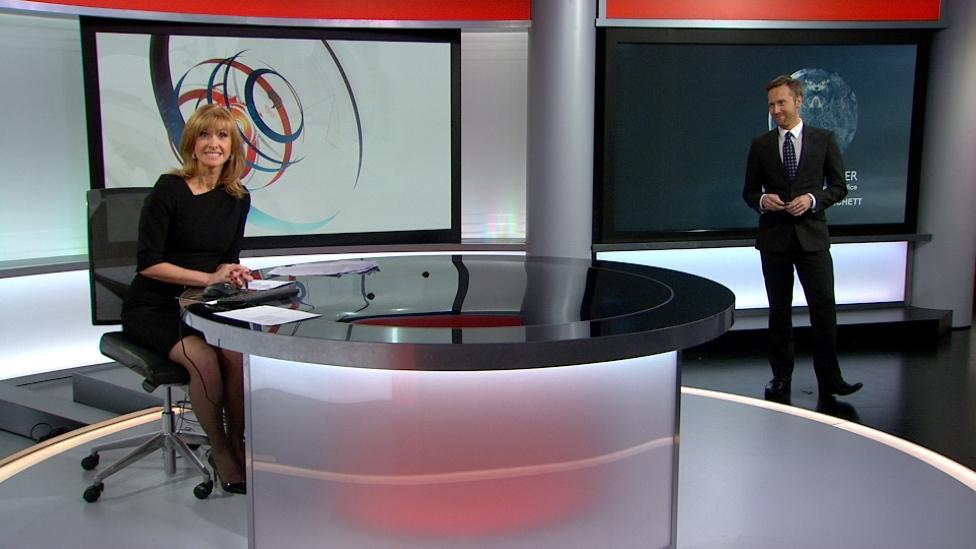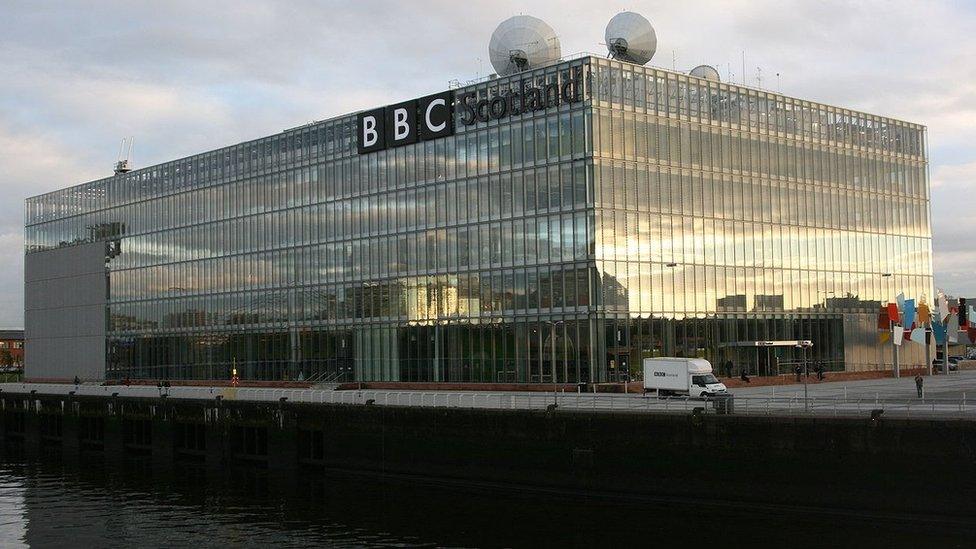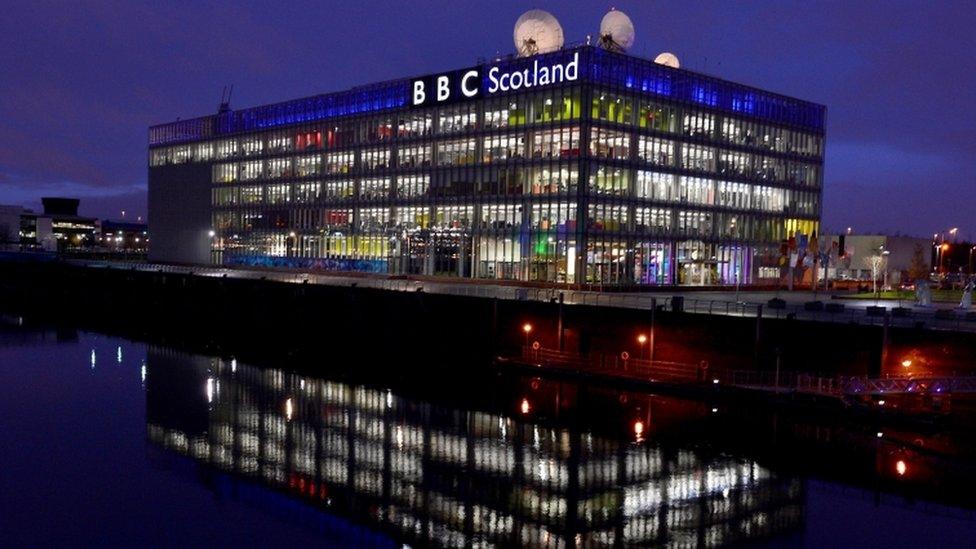BBC: And now, the News Where You Are
- Published

The campaign for a Scottish Six began last century. Some reckon that's where it should stay, as broadcast news evolves to become more online and more on-demand.
But politics has become involved, as it has with the future of the BBC charter and funding. So others argue that the case for the Scottish Six is long overdue: if only the BBC would just get on with it.
The campaign has been given a new boost of energy. A study of public service broadcasting by a committee led by Lord Puttnam concluded a lot last month, one part of it being support for the idea.
Now, a committee of MPs, dominated by English backbench Tories (reflecting the Government majority), has set out its own agenda for BBC reform, external, and they agree that Scots should have their own news.
The idea can be much misunderstood. It is the working title of a mythical single TV programme, broadcast during the BBC1 "news hour" of 18:00 to 19:00, which combines Scottish, UK and international news. And perhaps some features.
What that means is a running order of news items that weighs up developments from terror in France, to Donald Trump, Westminster politics, the Old Bailey, the drugs available from the NHS in England, Yorkshire protests on high-speed rail, Police Scotland numbers, murders in Scotland and England, asbestos on Prestwick beach, and two heart-warming stories about dogs being saved - one in Northern Ireland, the other with an Edinburgh link.
Divergent nations
Those are among the stories running on the BBC UK and Scottish websites as I write. They are not typical - the news schedule is being sun-bleached by the notorious "silly season". Viewed from the newsroom in Glasgow, where I'm working, they can and would be ordered differently from the view taken by a news editor based in London.
Some would probably not be included at all in a Scottish Six programme, including court cases from England and those Yorkshire protests against rail plans. In the unwritten rules of news values, it's assumed that crime and much else is more interesting the closer it gets to home.
The story about HIV drugs is harder to call. It has been playing big in UK news. The issue in Scotland requires interpretation of whether, how and when new and expensive drugs might be made available in Scotland.
At present, the Scottish angle on an NHS England health story could be reported after the news from London, as part of Reporting Scotland, starting at 6.30pm. But having seen the story broadcast before 6.15pm, the Scottish viewer has to wait perhaps up to half an hour to see if there's a Scottish angle on Reporting Scotland.
Murder, she reported
The Scottish Six idea would allow for a schedule or running order of news stories to be created which reflects on things being done differently in Scotland, on items of interest to a Scottish audience from the rest of the UK, and international news.

This became possible 20 years ago, with the use of satellites to beam video reports instantly to BBC newsrooms in London, Glasgow or anywhere else. The same report, from anywhere in the world, became available simultaneously.
Combining a news schedule from across the world, the UK and Scotland has been achieved for more than two centuries by Scotland's national newspapers. For fewer decades, it's been the case with radio.
On Radio Scotland, this evening's 17:00 bulletin led with a story about a review of a child abuse case in Fife, the funeral of a priest murdered in France, an air crash near Oban, the use of gas as a weapon in Syria, the future of BBC news, a nightclub murder case from Northampton, an Ayrshire rape case, the Police Scotland workforce and commemorating Stan Laurel at his Glasgow birthplace.
At the same time, on BBC Radio 4, you would have heard first about the HIV drugs, the French priest, the Northampton murder, a Cambridgeshire murder, migrants dying in the Mediterranean, Britain's commissioner in Brussels and a shark off the coast of Cornwall.
Since at least 1978, Radio Scotland has been combining news bulletins in its own way, for a Scottish audience. So for listeners to Good Morning Scotland or Newsdrive, or for readers of the Press & Journal or The Herald - 227 years after it was publishing in Glasgow with reports of republican trouble brewing for French royalty - this is hardly a radical idea.
The Ten
But it is a controversial one. Back in 1998, then BBC director-general John Birt urged Downing Street ministers to do what they could to resist pressure for a Scottish Six. He wrote as much in his memoirs. It is rare, to say the least, that a BBC manager volunteers information about voluntarily compromising the Corporation's editorial independence.
Later made Lord Birt, the then Corporation's editor-in-chief reflected the view that there are points in the day, week and year at which the BBC's audience across England, Wales, Scotland and Northern Ireland should be brought together as one.
It happens with big sporting occasions, in acts of remembrance and royal pageantry, with Christmas comedy favourites and, on a daily basis, with news programmes which carry a lot of prestige and resource. Within the BBC, these are venerated as "The One", "The Six" and "The Ten".
Watching the news that way, as a sort of unifying act in common with millions of others, is the starting assumption for TV schedulers. For all that it is being criticised as too narrowly Scottish and parochial, Reporting Scotland is watched by nearly one in ten Scots on the average night. STV's News at Six is a strong rival to the BBC Scotland flagship, and much better than the programmes offered by ITV to its English regional audiences.
But that view of viewers is being challenged as never before. It is partly that TV watchers have a much wider range of channel choice than the days when this 20th century habit was set. Audiences can go elsewhere.
While work patterns and family time become more flexible, audiences can also choose to see the news when they want it. And by going online, they can choose which bits of the news they watch. That means they can edit their own schedule of stories, from different news providers. They can do so in video, audio and script. And they can mix from across the world, the UK and different parts of the UK, as well as across subject matters; entertainment, education, health, science and technology.
Tone deaf
So the nation doesn't sit down as one. And the other problem with that traditional view of nightly news broadcasting is that there are hotly contested notions of which nation the news should be for. Supporters of Scottish independence don't wish to recognise that Scottish news belongs within UK news, or that they should wait for a lot of English-only news before getting their fix on Scotland.
Even without independence, devolution has fractured the way news stories develop. That story on HIV drugs availability in NHS England is an example of the way the health service has diverged across the four constituent parts of the UK. Education in Scotland was always different, as was its legal system.
So Reporting Scotland, as it now exists, is seen to be unsatisfactory in at least four ways;
If a news story from Scotland is deemed important to the UK audience, it will run between 18:00 and 18:30, and then it will be repeated.
If it is on a subject well-known to Scottish viewers, but is new to others, then it can appear over-simplified or, frankly, a bit tone deaf to the nuances. That was a problem during the independence referendum campaign.
If the story is important to Scots, but not when viewed important by editors in London, it will follow the light-hearted "And Finally" report (dogs, cats or Stan Laurel), plus any sport and the UK weather.
The impression is created, and sustained every evening, that in order to understand and explain really important UK and world issues, you have to be based in London. That can grate on viewers who are based elsewhere.
Going live
But to create a Scottish Six, there are practical problems. One is cost, when BBC budgets are being tightly squeezed. There would inevitably be some duplication. And the skills of gathering news from around the world would have to be built up within BBC Scotland, where they are now rare or absent.
There is a risk that a lower level of resourcing for Scottish news would look less impressive and slick than the news from London. In general, journalists in the BBC's Scottish newsrooms support the idea of a Scottish Six, but on condition that it is adequately resourced. Doing it on the cheap would surely bring criticism of lower standards, of poorer quality journalism, or complaints that the BBC's bosses are starving this experiment of cash in order to make it fail.
Another question: what happens when a story is so important that it should lead the news from London as well as from Glasgow, but with limited reporters available - a terror incident or a natural disaster in a foreign country, for instance?
It would be near impossible to carry a live report simultaneously on different channels. But a recorded version of a live "gob-on-a-stick", as they're indelicately known, can be a substitute. As Radio Scotland news producers could tell you, that requires programme editors in London, and foreign correspondents, to recognise Scottish programming as something to be included in their plans.
Integrated
There are ways and means of handling such challenges. The news may look and sound a bit different. From anywhere in the UK, those who don't like a change would still be able to find a channel on which they could watch the Six O'Clock News as it is currently broadcast.

So if this were just about journalism, and giving audiences choice, then there probably wouldn't be much fuss about offering a Scottish Six.
But it's also about politics. The lack of integrated news from Scotland for Scots is cited as evidence that the BBC hierarchy doesn't understand how much things have changed in Scotland, and how much the Corporation's news output is under hostile scrutiny from those who don't like the Britishness of this broadcasting corporation.
On the other hand, it's not hard to find outright hostility to the idea of a Scottish Six, or at least to the way it's perceived. Some fear that it could mean a doubling of the time dedicated to Scottish news, getting ever closer to the parish pump, and that the Corporation is somehow conspiring to deprive Scots of a window on the world beyond the Tweed.
Or they think it will be a platform on which the independence cause would thrive. Not only would it give Scottish politicians a prominence alongside world leaders, but it could be seen as framing Scotland as a country from which the world looks different, from which the rest of the UK is put at arm's length. To frame it that way is, itself, a political choice.
Digital channel
This argument could go on for a further 20 years. Views have strengthened about Scottish independence since the Scottish Six idea was first floated. The BBC is not good at making difficult decisions, particularly when there is resistance inside the machine.
But the technology of television has fundamentally changed over the past two decades, and in another two decades, it could look unrecognisable. The move to editing your own news online may have made the nightly schedule all but redundant.
Alternatively, it's already possible to deliver a much more radical plan than the Scottish Six. Yet that plan, for a Scottish digital channel, is one that seems to have been sidelined, by its cost and by this focus on news.
On a digital channel, the Scottish Six news programme would be only one part of an evening's viewing. It's an idea set out by the Scottish Broadcasting Commission, which was set up by the Scottish government. Nicola Sturgeon argued for it in a speech a year ago. It was reported that a version of it was being worked up by BBC Scotland executives, though that process seems to have gone cold.
On that channel, there could be more Scottish current affairs, drama, culture and entertainment. It would be viewed by those who want to view it, without limiting options for those who don't - just as they can watch in Gaelic on BBC Alba, and dozens of other channels besides.
Politics could drive change, or it could block it. But technology might set the pace. And it could do so in a way that makes all this far less of an issue about Scotland's claim to be exceptional.
Couldn't there also be a case for integrating the Six O'Clock News as it's seen from Cardiff, Belfast and Salford? And then we could do it all over again at Ten O'Clock.
- Published2 August 2016
